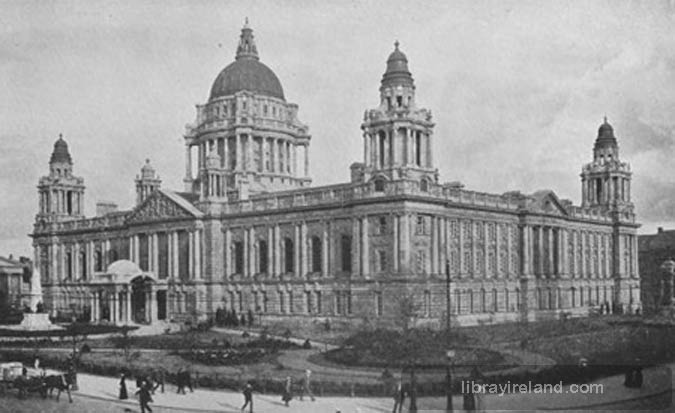Cotton - Story of Belfast
THE first piece of cotton woven in Ireland was made by an ancestor of Mr. Francis McCracken in the year 1777. Cotton manufacturing was once a very flourishing and important industry, but has now grievously declined here. When Robert Joy was travelling through North Britain, he was deeply impressed with the cotton industry as a source of opulence in that country.
He was prompted by an earnest desire to serve the working poor of Belfast, and also to improve the more intricate branches of manufacture. After much thought he and Thomas McCabe suggested that spinning cotton yarn might be made a suitable employment for the children in the Poorhouse. They set them to work with common wheels. The first machine was invented by David Manson. Then, finding superior machines were used in England, they introduced them here. A Mr. Nicholas Grimshaw, who had come from England to settle in Belfast, superintended the making of the first spinning machine at Mr. Joy's sole expense. He also brought over an experienced Scotchman to instruct the children in the Poorhouse. Later on he introduced a carding machine. Cotton thread, yarn, candle wick, gloves and stockings were all made by the children in the Poorhouse. In vain Mr. Joy sought pecuniary aid, as he had done so much at his own expense. He then offered the machinery to the Poorhouse, but the trustees refused to accept it, and the reason of their refusal was never made very clear.
Joy, McCabe and McCracken formed a company, and their cotton dimity and Marseilles quilting attained a great celebrity. The first cotton mill was in Francis Street, off Smithfield. It belonged to Captain John McCracken, and his eldest son had a sailcloth factory, and a rope walk in James Street. Another brother had a cotton mill in Donegall Street. Their mother manufactured cambric and bleached it in the Basin Field in Millfield. Mary McCracken, the dearly beloved sister of Henry Joy MacCracken, had a muslin factory in High Street. Their brother-in-law had a cotton mill at Clonard. The first mill to spin by water was erected by Nicholas Grimshaw in the year 1781.
Twenty-three years afterwards, 27,000 people were employed in the cotton mills.
There was a cotton mill in Waring Street, which was worked by a horse in 1796, and another in Millfield. The first steam-engine used in Belfast was at Springfield cotton mill—"Stevenson's." It was used for pumping water to drive a water wheel. The cotton trade was held supreme, and was a most flourishing industry until about the year 1800, when the American war stopped the supply of raw cotton. There were forty-six firms engaged in the trade. Steam-engines were very rare at that time, but there was one that worked a little cotton mill in Cotton Court, and the beam was made of wood.
One factory advertised that their engine would work three days in the week, and would be open to public inspection.
Thomas and Andrew Mulholland were weavers of cotton and manufacturers of muslin until their mill in York Street was burned in the year 1828. When rebuilding, they had careful inquiry and deliberation whether to prepare for linen or wool. Finally they decided on linen. Afterwards a great number of mills changed to linen work. Lepper's mill was burned in 1875, and Springfield was then the only cotton mill left in Belfast, and perhaps in the whole of Ireland.
Looking back to the early history of the cotton trade, we can scarcely realise how much we are indebted to those men, who in the face of much apathy and indeed active opposition at one time, gave their time, talents and money to establish an industry that brought employment to the working people.
Robert Joy belonged to a well-known Belfast family. They were of Huguenot descent, their name being originally Joyeuse. His ancestor was Francis Joy, who had the first paper mill at Randalstown, and it was he who established the Belfast Newsletter in 1737, the third paper in Ireland. His grandson was the ill-fated Henry Joy McCracken, and his son was Lord Chief Baron Joy. Thomas McCabe and McCracken with Nicholas Grimshaw deserve to be most gratefully held in honoured remembrance for their unselfish services to the town. Their names are almost forgotten, and there are few descendants here now. The Grimshaws were mill-owners at Whitehouse and large employers of labour. One Easter Monday, forty members of this family were present at an entertainment on the Cave Hill, and to-day there is not one of the name in or near Whitehouse. Belfast owes a large debt to these pioneers of industry.

